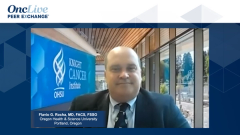
Guidelines for Molecular Testing in Biliary Tract Cancers
Panelists share their perspectives on molecular testing guidelines for patients diagnosed with biliary tract cancers.
Episodes in this series

Transcript:
Milind Javle, MD: You highlighted the role of biomarker testing. Ruth, is this standard in your practice? One barrier you face for biomarker testing is that often tissue is the issue. We don’t get enough tissue. How do you deal with this situation, in which we want biomarker testing yet not be able to [have it]?
Aiwu Ruth He, MD: For everyone who’s going to get systemic therapy, we’ll try to get a tumor profile. We run into a situation in which there’s an insufficient amount of tumor for molecular testing. We try to use circulating DNA as liquid biopsy profile. Although we’re moving ahead and still collecting data, we try to look at the concordance between tumor profile and liquid biopsy profile. In the case when there’s no tissue for profiling, we use the liquid biopsy to generate some data, make sense of those data, and select therapy.
Milind Javle, MD: Any other comments from the group? Flavio, Anjana, or Mark, do you have any? Flavio, do you profile patients who have surgery?
Flavio G. Rocha, MD, FACS, FSSO: I just had a question about that. Although these agents aren’t approved in the localized or resectable setting, we’re starting to learn a little from resected specimens that do get profiled, that the mutational landscape might be different between those with advanced disease and earlier-stage disease. The reason why this is important is that as we move toward treating these patients with neoadjuvant therapy, that might become relevant. Curious to hear from the group if others are getting profiling on localized disease.
Anjana Pillai, MD: We are. We do on every specimen. Exactly to your point. Also, most of these tumors recur even with resection after 5 years. It’s usually a 30% survival. It’s especially important in that sense, so you have an idea based on how they present. Hopefully, we can talk about this a little more in the role of transplant in some of these patients. All that changes what’s historically considered standard of care and what we’re doing in a lot of our institutions.
Milind Javle, MD: Thank you. I often tell patients that molecular profiling isn’t just about targeted therapy. It also has prognostic implications. I saw a patient a couple of weeks ago with a small, resected tumor, 2.5 cm in extrahepatic cholangial but had KRAS G2M mutation. Would I approach that patient different if they had, for instance, an FGFR2 fusion? We’re learning. I’m not sure we’re there yet, but if you don’t look, we’re not going to find. We try to profile all stages. I’m with you on that. Without that, we’re not going to develop new therapies. Mark, I see you have a comment.
Mark Yarchoan, MD: These patients should get profiled at the time of surgery, but that brings up all sorts of challenges with what to do with the information. If you find an intrahepatic cholangiocarcinoma, and your plan is to implement 6 months of adjuvant capecitabine and then you find that the patient is mismatched repair is deficient, what do you do with that? If you find that the patient has a HER2 [human epidermal growth factor receptor 2] mutation, do you add anti-HER2 agents in the adjuvant setting? To be prepared, find answers that make your management more complicated.
Flavio G. Rocha, MD, FACS, FSSO: Mark, I’ll jump in because I had a recent case, and because we’re talking about our experiences of a patient who had a large right-sided intrahepatic cholangiocarcinoma and a history of Lynch syndrome. On that biopsy, we obtained the MSI [microsatellite instability]–high status, treated the patient with several months of pembrolizumab, had a dramatic response, and resected the patient—who now has 5% viable tumor left negative lymph nodes. Much to your question: what do we do now?
Transcript edited for clarity.










































